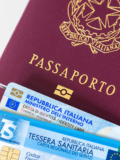Glossary Age verification
Age verification
 Age verification for the sale of alcohol and tobacco
Age verification for the sale of alcohol and tobacco
Age verification is a legally prescribed procedure for controlling the sale of age-restricted products, particularly alcohol and tobacco. It is intended to protect minors and is mandatory in both physical and online retail. While the specific legal requirements vary from country to country, they are essentially comparable.
What is age verification?
Age verification is any measure taken to ensure that a person has reached the legally prescribed minimum age before being given access to age-restricted products. In the sales process, this applies in particular to:
- Alcoholic beverages (beer, wine, spirits)
- Tobacco products (cigarettes, cigars, e-cigarettes, nicotine products)
Depending on the sector and sales channel, age verification may be carried out either on-site by sales staff or digitally using technical systems.
Age verification for the sale of alcohol and tobacco products is legally required in all German-speaking countries. While the underlying principle is similar, the specific regulations in the DACH region differ in terms of age limits, responsibilities, and verification process requirements. The following sections provide an overview of the national requirements in each country.
Age verification in Switzerland
In Switzerland, the sale of alcohol and tobacco is regulated by various federal laws, in particular:
The central age limits are as follows:
- Beer and wine: from 16 years
- Spirits and mixed drinks with distilled alcohol: from 18 years of age
- Tobacco products: in most cantons from the age of 18
Online retailers must use an effective age verification system and ensure that it works properly. According to the Federal Food Safety and Veterinary Office (FSVO), the following methods are considered sufficient:
- Digital age check in the online store
- Verification by means of an official ID document
- Check on delivery or collection by staff or logistics partners
Simple methods such as date of birth fields, checkboxes or notes in the general terms and conditions are not recognised.
Age verification in Germany
In Germany, the Youth Protection Act (JuSchG) regulates the sale of alcohol and tobacco products to young people. The most important requirements are
- Sale of beer, wine and sparkling wine: from the age of 16
- Sale of spirits and mixed drinks with distilled alcohol: from the age of 18
- Sale of tobacco products and e-cigarettes: from the age of 18
In traditional retail, the check is carried out by visually inspecting the ID. In online retail, digital age verification is mandatory either during the ordering process or upon delivery. Acceptable methods include age verification via Postident or Autoident, ID verification with data comparison, or delivery services with age verification.
Simplified queries, such as those involving checkboxes, date of birth fields or credit card payments without validation, are not legally sufficient.
Age verification in Austria
In Austria, the protection of minors is regulated at state level, which sometimes results in different age limits. The following generally applies:
- Alcoholic beverages: from 16 or 18 years of age (depending on category and federal state)
- Tobacco products and related products: from 18 years of age
Reliable age verification is also required for online retailers in Austria. Similar procedures to those used in Germany are employed. Suppliers delivering products to Austria must also adhere to Austrian age limits.
 Digital age verification in E-Commerce
Digital age verification in E-Commerce
Regardless of the country, age verification in e-commerce requires technical solutions. These systems must be legally compliant and, at the same time, provide users with a smooth experience.
Solutions such as digital age verification for e-commerce, gaming and streaming platforms rely on automated verification procedures that use ID data and, if necessary, biometric features for age verification. This process is seamless and does not require an app.
Differentiation from related methods
The age check focuses exclusively on the legal minimum age. It differs from:
- Identity checks where complete personal data must be compared (e.g. for KYC processes)
- Delivery checks that only take effect upon delivery and are only effective in combination with documented verification
- Age checks without verification, such as entering a date of birth or ticking a checkbox
Declaratory proof alone is insufficient for legally compliant age verification in online retail. A comprehensible and documented check using technical or personal procedures is required instead.
Digital age verification with PXL Vision
Providers of age-restricted products, such as alcohol and tobacco, often require a solution that is both legally compliant and user-friendly. Digital age verification systems must reliably check whether the legally required minimum age has been reached, ideally without causing any disruption or requiring complex user interactions.
PXL Vision's PXL Age is a browser-based solution that works without an app and enables age verification in under 20 seconds. It can be flexibly integrated into existing e-commerce processes and supports documents from over 165 countries, offering extended security levels for industries with particularly high requirements.
FAQ on age verification
An automated check using official ID data or an ID check by trained personnel. Checkboxes or date of birth fields are not sufficient.
The supplier - regardless of whether they sell directly or via a platform.
Yes, particularly with regard to age limits and verification obligations. However, all three countries have an obligation to carry out age checks.
.png?width=126&height=101&name=logo%20(2).png)
.png?width=63&height=51&name=logo%20(6).png)




